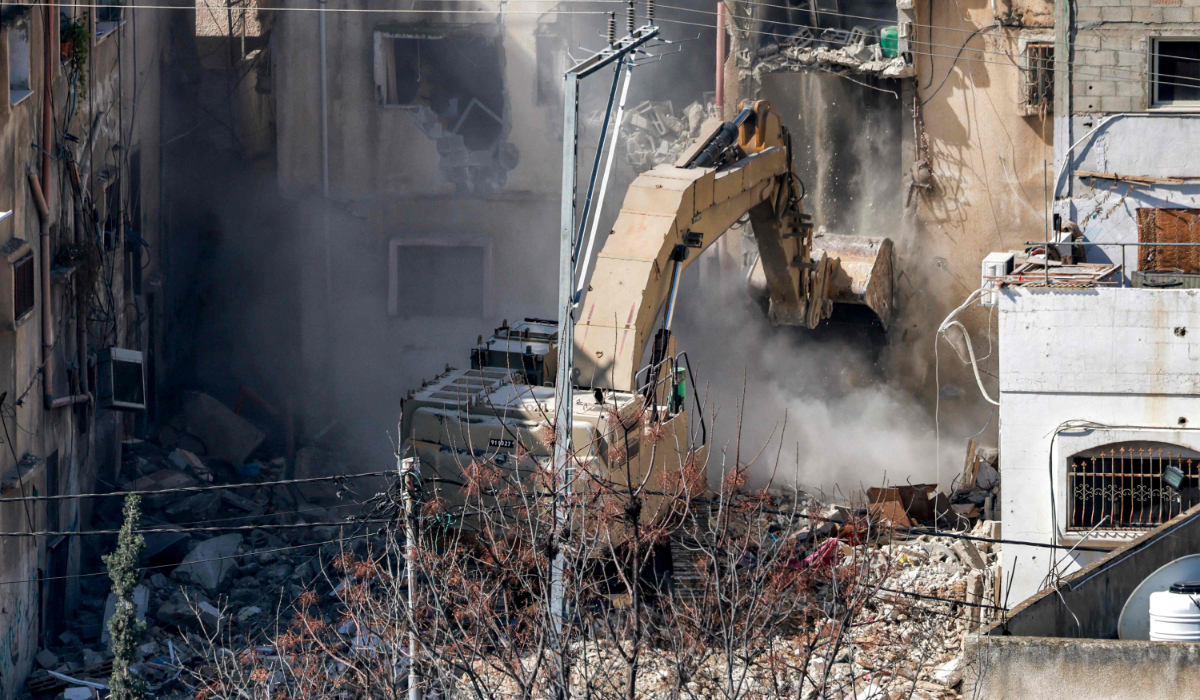CAIRO: Israeli airstrikes on three houses in the southern Gaza city of Rafah killed at least 25 Palestinians and wounded many others, medics said on Monday, as leaders of Hamas arrived in Cairo for a new round of talks with Egyptian and Qatari mediators.
In Gaza City, in the north of the Gaza Strip, Israeli warplanes struck two houses, killing at least four people and wounding several people, health officials said. The strike on the other house killed two brothers, they added.
The strikes on Rafah, where more than one million people have sought refuge from months of Israeli bombardment, took place hours before Egypt was expected to host leaders of the Islamist group Hamas to discuss prospects for a ceasefire agreement with Israel.
The Israeli military said it was checking the reports.
Speaking on Monday at a World Economic Forum meeting in Riyadh, Saudi Arabia, Egyptian Foreign Minister Sameh Shoukry said Egypt was hopeful about a proposal for a truce and the release of hostages in the Gaza Strip but it was waiting for a response on the plan from Israel and Hamas.
“We are hopeful the proposal has taken into account the positions of both sides, has tried to extract moderation from both sides, and we are waiting to have a final decision,” Shoukry said.
Asked about the new round of talks in Cairo, a Palestinian official close to mediation effort told Reuters: “Things look better this time,” but he declined to say whether an agreement was imminent.
Israel has vowed to eradicate Hamas, which controls Gaza. Its six-month-long military operation has now killed 34,488 Palestinians, 34 of them in the past 24 hours, and wounded 77,643, according to Gaza’s health authorities. The war has displaced most of the 2.3 million population and laid much of the enclave to waste.
The conflict was triggered by an attack by Hamas militants on Israel on Oct. 7 in which they killed 1,200 people and took 253 hostage, according to Israeli tallies.
An assault on Rafah, which Israel says is the last Hamas stronghold in the Gaza Strip, has been anticipated for weeks but foreign governments and the United Nations have expressed concern that such action could result in a humanitarian disaster given the number of displaced people crammed into the area.
On Sunday, Hamas officials said a delegation led by Khalil Al-Hayya, the group’s deputy Gaza chief, would discuss a ceasefire proposal handed by Hamas to mediators from Qatar and Egypt, as well as Israel’s response. Mediators, backed by the United States, have stepped up their efforts to conclude a deal.
Two Hamas officials who spoke to Reuters did not disclose details of the latest proposals, but a source briefed on the talks told Reuters that Hamas is expected to respond to Israel’s latest truce proposal delivered on Saturday.
The source said this included an agreement to accept the release of fewer than 40 hostages in exchange for releasing Palestinians held in Israeli jails, and to a second phase of a truce that includes a “period of sustained calm” — Israel’s compromise response to a Hamas demand for a permanent ceasefire.
After the first phase, Israel would allow free movement between south and north Gaza and a partial withdrawal of Israeli troops from Gaza, the source said.
A senior Hamas official told Reuters the Monday talks in Cairo will take place between the Hamas delegation and the Qatari and the Egyptian mediators to discuss remarks the group has made over the Israeli response to its recent proposal.
“Hamas has some questions and inquires over the Israeli response to its proposal, which the movement received from mediators on Friday,” the official told Reuters.
Those comments suggested Hamas may not hand an instant response to mediators over Israel’s latest proposal.
Meanwhile, at a hospital in Rafah, relatives of those killed by the Israeli strikes came to take the bodies away for burial. Women and men cried as they paid farewell to the slain relatives wrapped in white and black shrouds.
“His name is Deif-Allah (meaning guest in Arabic) and he was indeed a guest. He came as a guest after (his parents) longed for (him) for so long, after 10 years,” said Abu Taha holding the body of his baby boy, wrapped in a white shroud, in his arms.
“Ten people (were killed), the mother, her daughter, her granddaughters, her grandson, her son-in-law, their daughters and relatives, everyone. They’re all gone, all 10 of them,” Abu Taha said.
Israel kills at least 30 Palestinians in Rafah, new Gaza ceasefire talks expected in Cairo
https://arab.news/zgd4f
Israel kills at least 30 Palestinians in Rafah, new Gaza ceasefire talks expected in Cairo

- The strikes on Rafah took place hours before Egypt was expected to host leaders of the Islamist group Hamas to discuss prospects for a ceasefire agreement with Isra
- Hamas arrived in Cairo for a new round of talks with Egyptian and Qatari mediators






























